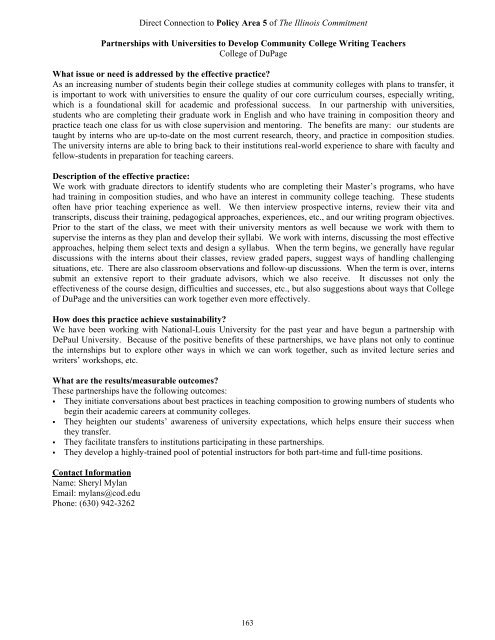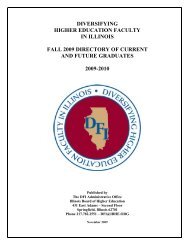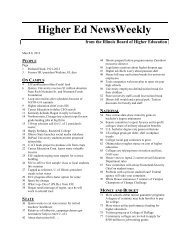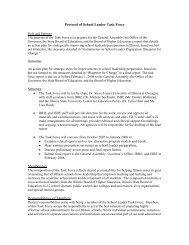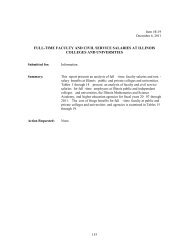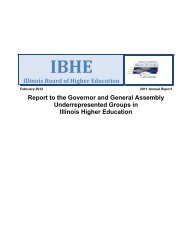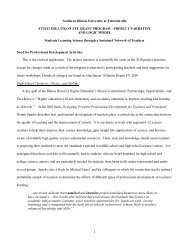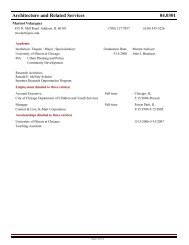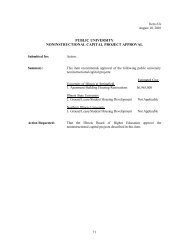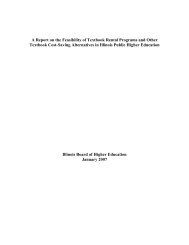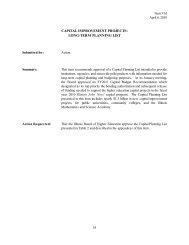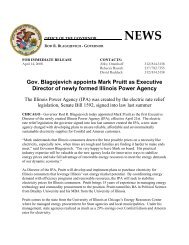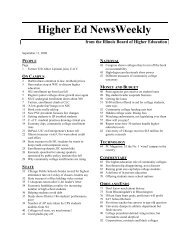Title of Effective Practice: - California Postsecondary Education ...
Title of Effective Practice: - California Postsecondary Education ...
Title of Effective Practice: - California Postsecondary Education ...
Create successful ePaper yourself
Turn your PDF publications into a flip-book with our unique Google optimized e-Paper software.
Direct Connection to Policy Area 5 <strong>of</strong> The Illinois Commitment<br />
Partnerships with Universities to Develop Community College Writing Teachers<br />
College <strong>of</strong> DuPage<br />
What issue or need is addressed by the effective practice?<br />
As an increasing number <strong>of</strong> students begin their college studies at community colleges with plans to transfer, it<br />
is important to work with universities to ensure the quality <strong>of</strong> our core curriculum courses, especially writing,<br />
which is a foundational skill for academic and pr<strong>of</strong>essional success. In our partnership with universities,<br />
students who are completing their graduate work in English and who have training in composition theory and<br />
practice teach one class for us with close supervision and mentoring. The benefits are many: our students are<br />
taught by interns who are up-to-date on the most current research, theory, and practice in composition studies.<br />
The university interns are able to bring back to their institutions real-world experience to share with faculty and<br />
fellow-students in preparation for teaching careers.<br />
Description <strong>of</strong> the effective practice:<br />
We work with graduate directors to identify students who are completing their Master’s programs, who have<br />
had training in composition studies, and who have an interest in community college teaching. These students<br />
<strong>of</strong>ten have prior teaching experience as well. We then interview prospective interns, review their vita and<br />
transcripts, discuss their training, pedagogical approaches, experiences, etc., and our writing program objectives.<br />
Prior to the start <strong>of</strong> the class, we meet with their university mentors as well because we work with them to<br />
supervise the interns as they plan and develop their syllabi. We work with interns, discussing the most effective<br />
approaches, helping them select texts and design a syllabus. When the term begins, we generally have regular<br />
discussions with the interns about their classes, review graded papers, suggest ways <strong>of</strong> handling challenging<br />
situations, etc. There are also classroom observations and follow-up discussions. When the term is over, interns<br />
submit an extensive report to their graduate advisors, which we also receive. It discusses not only the<br />
effectiveness <strong>of</strong> the course design, difficulties and successes, etc., but also suggestions about ways that College<br />
<strong>of</strong> DuPage and the universities can work together even more effectively.<br />
How does this practice achieve sustainability?<br />
We have been working with National-Louis University for the past year and have begun a partnership with<br />
DePaul University. Because <strong>of</strong> the positive benefits <strong>of</strong> these partnerships, we have plans not only to continue<br />
the internships but to explore other ways in which we can work together, such as invited lecture series and<br />
writers’ workshops, etc.<br />
What are the results/measurable outcomes?<br />
These partnerships have the following outcomes:<br />
• They initiate conversations about best practices in teaching composition to growing numbers <strong>of</strong> students who<br />
begin their academic careers at community colleges.<br />
• They heighten our students’ awareness <strong>of</strong> university expectations, which helps ensure their success when<br />
they transfer.<br />
• They facilitate transfers to institutions participating in these partnerships.<br />
• They develop a highly-trained pool <strong>of</strong> potential instructors for both part-time and full-time positions.<br />
Contact Information<br />
Name: Sheryl Mylan<br />
Email: mylans@cod.edu<br />
Phone: (630) 942-3262<br />
163


